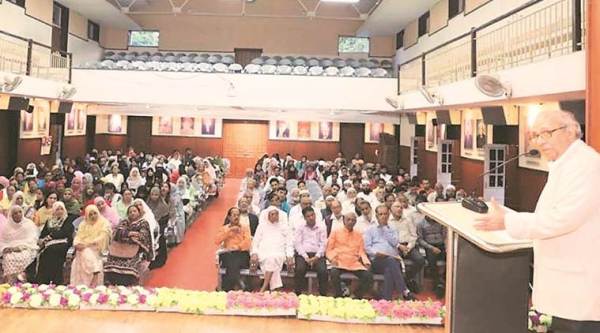As many as 300 people from Pune and other cities attended the programme on the first day, which included students, teachers and admirers of Urdu poetry.
TO MARK the 150th death anniversary of prominent Urdu poet Mirza Ghalib, the Ghalib Institute in association with Deccan Muslim Institute, Pune, held a two-day national seminar on the theme ‘Our cultural tradition and Ghalib’ on September 27 and 28. The inauguration ceremony was held on Friday on Azam campus in Pune.
Abeda Inamdar, president, Deccan Muslim Institute, Pune, was the chair at the event and Syed Shahid Mehdi, former vice-chancellor of Jamia Millia Islamia, was the chief guest. The seminar also marked the golden jubilee celebration of Ghalib Institute. As many as 300 people from Pune and other cities attended the programme on the first day, which included students, teachers and admirers of Urdu poetry.
The inauguration ceremony was followed by ‘Sham-e-Ghazal’, featuring various ghazals of Ghalib.
On Day 2, a technical session was arranged from 10 am to 5 pm, where papers were presented by students from the research centre of Deccan Muslim Institute, postgraduate students of Urdu, teachers of Urdu-medium zilla parishad schools and schools under the Pune Municipal Corporation.
“Every year, Ghalib Institute has functions based on different themes linked with various aspects of Ghalib’s works,” Mehdi said, adding, “it also has a robust publications programme and has published 60 to 70 books on Ghalib.”
“The seminar discusses Ghalib’s life and how it is relevant today. The new generation will gain knowledge about the situation of India 150 years ago, the history and sociopolitical scenario through his works,” Inamdar said, adding, “Ghalib died in 1869, way before the freedom struggle but he could foresee it and guided Indians to join hands and fight intruders to regain their land. In India, one will always find respect for humanity and equality as Indian culture was always about unity in diversity.”
Speaking on Ghalib’s poetry, Inamdar also said language never died as it was a medium of communication. “Urdu is a sweet, beautiful and rich language,” she said. “People always want to learn its meaning and style of pronunciation. From Kashmir to Kanyakumari, Gujarat to Assam, one will always encounter spoken Urdu as it is a common man’s language,” she added.
Source: Read Full Article


